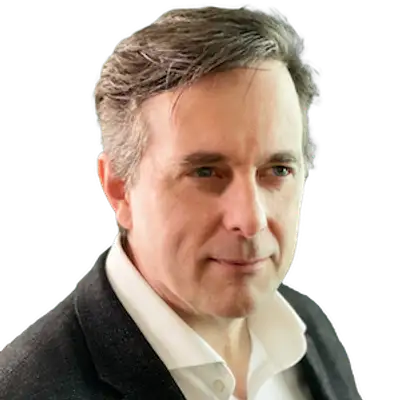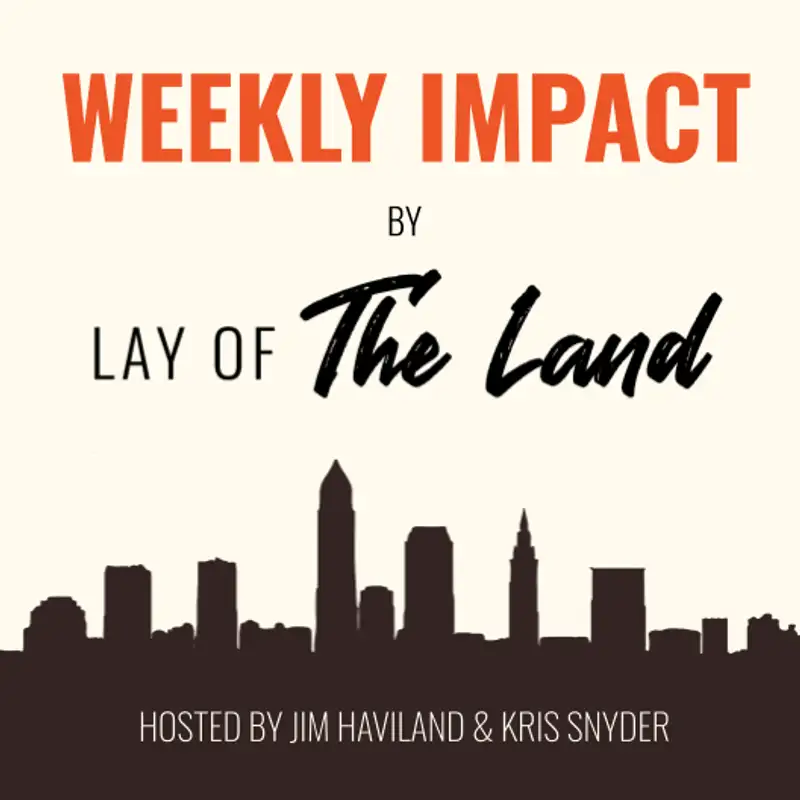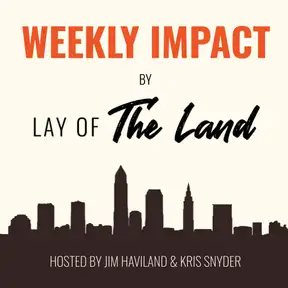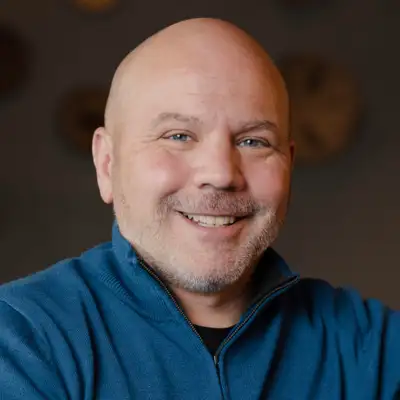8-12-24 Andor Creative, Exit Planning Institute
Jim Haviland (00:01.261)
Welcome everybody. This is Lay of the Land weekly impact. I'm Jim Havilland.
Kris Snyder (00:06.546)
and I'm Kris Snyder.
Jim Haviland (00:08.269)
Hey Kris, how you doing this week?
Kris Snyder (00:10.455)
Well, Jim, I know it's a little early for you. You're out in California this week.
Jim Haviland (00:13.113)
It is, I'm on my quarterly trip to California for a bunch of clients out here, but I've had some great experiences. I've also talked about, about today, we're first of all, we're talking about number 178, Jared Anderson, Sandor Gyerman Andor Creative. really, these guys are really charming as all get out, aren't they?
Kris Snyder (00:31.934)
100%. Yeah, I had the opportunity to meet them at the, our fall kind of alumni for lay of the land gathering last year. And they're just super motivated. They're authentic as they came off on the podcast, right? They play off each other constantly. And we went out and had lunch after that meeting and just continued their sponges, right? They talked about a mentor that they had that went and saw in Florida, very just not just passionate about what they're building, but learning.
Jim Haviland (00:40.11)
Yeah.
Kris Snyder (01:00.503)
And I enjoy kind of that open approach and trying to absorb all things, right, that are business building, but also just life too. They chatted about being grateful for the lives they live.
Jim Haviland (01:08.749)
Yeah, and.
This will be a theme today because I mean, as leaders, mean, they're the level, the degree to which they're they're just in the wonder of building their business. And they're, you know, they're they're curious more than they they have to get it right more than they want to be right. That's Brené Brown quote on that, I think, is makes them puts them in a great place to build a great business. also love the fact that they're from Cleveland State and they're doing this doing this amazing work for Mercedes and other international brands.
You know, just getting the experience of college and working on stuff, I think is good, but you don't have to go Harvard to do great things.
Kris Snyder (01:53.874)
Well, Geno Wickman wrote a book called The Entrepreneurial Leap and he was trying to solve for, know, does everyone have the ability to be an entrepreneur? Is there something in you that you could take this test? And his theory, which I appreciate, was like, don't do it. If you don't want all that comes with this journey, don't do it, right? Like there's so many other ways to go out have a job and have a life than being an entrepreneur. But what you heard them talk about was they didn't have a choice. It was early in their...
Jim Haviland (02:09.334)
Right, right, right.
Kris Snyder (02:21.746)
their DNA and trying to make money and the things they did all the way to the fact they found themselves while at Cleveland State riffing on like what kind of things could we do together, right? And then find something that you have passion around that you're really good at. Some would say maybe even your superpower and social media was theirs, right? And then they set out to try to figure out how to turn that into a business and also just love that grit, right? Of going out and taking our chance and door to door asking
Jim Haviland (02:37.431)
Right. Yep.
Kris Snyder (02:50.92)
business owners, what they could do for them with them on social media, which kind of launched that through their coffee shop experience to where they're at today.
Jim Haviland (02:56.663)
Yeah. Yeah. That's the level of teamwork where we're just going to do it. What it's going to take, you know, and then how they apply that to the way they think about the rest of their team. Like, you know, it's really, there is no, there are no stratums in their business. It's like, everyone's just got to have, going to have ideas and go do something. I love that. I love that. I think that.
Kris Snyder (03:15.502)
Yeah, well, the principle, the principle of starting a business in the five stages of business building, right? We start off survival, sustainable, scaling, success and stewardship. And that survival mode, when they started it, they both thought they were good at everything. Until they added some realization that what you do is you specialize to scale, right? So even in just the pairing of the two of them, they had to figure out one was better with kind of account management behind the scenes.
Jim Haviland (03:33.301)
Right. Yeah.
Kris Snyder (03:43.162)
One was more creative in its delivery. EOS speak, that's your yin and yang, that's your visionary, your integrator pairing. And the businesses I've seen that scale fastest is when you have a partnership that recognizes that. Because doing it by yourself can be done, it's done all the time. It's just different than having someone to be there with you, for you through all those things that occur.
Jim Haviland (03:46.86)
Yep.
Jim Haviland (03:56.279)
Yes.
Jim Haviland (04:01.741)
Yeah. Holding each other accountable, reading the label on the jar, all that kind of stuff. I love all that. Well, that would be great. So hopefully, they'll hear a lot more from that. I'm sure it'll be super fun. So Kris, you had an experience with the exit planners.
Kris Snyder (04:17.31)
Jim I really like the whole Gen Z conversation around.
Kris Snyder (04:24.412)
Yeah, would just one last thing on Andor before we go. I love the Gen Z talking about the difference between our dealer yelling at somebody, right? Versus showing the experience of the car in Cleveland in the backdrop, right? Like, because you and I grew up with those ads where the guy was just yelling about the savings and come on down to do whatever, right? Like, and what a nonsensical do anyways. But yeah, and my other comment would be,
Jim Haviland (04:30.349)
Yeah.
Jim Haviland (04:35.671)
Right. yeah.
Jim Haviland (04:46.176)
Yes.
Kris Snyder (04:51.538)
They talked about online community and this was such a good analogy. Like if you talk about really it's a friendship, it's a partnership in the community. And if you only talk to your spouse once a month, what kind of relationship would you have? And it seems so obvious, right? But like if you're gonna go do something digitally, you can't do it at a frequency to build trust that is on occasion, right? Without intention and design. So that's my wrap up. Again, great, great episode. Really appreciate it. Go see him, Jared.
Jim Haviland (05:04.862)
Right.
Jim Haviland (05:19.537)
Yeah, which is a great, mean, if you don't get a chance to listen to the episode folk, but you should, take that away that it's, social media helps you develop that kind of relationship, that the frequency and cadence and the authenticity, you can have that with everybody in your universe. And that's a powerful thing.
So Kris, all right, so Kris, all right, moving on. we got, last week you had a chance to talk with the folks at the Exit Planners Institute. And Kris, I think this is maybe a hidden gem inside Cleveland.
Kris Snyder (05:55.39)
Yeah, right here in Cleveland. mean, so they bought the organization in 2014, I think, and then moved it to Cleveland. Today, the team, I think it's around 35 people, but more importantly, they're on a path to address a 12, I'm get this right, I it's like $12 trillion opportunity and all the secession that's happening out there.
And so really they've got about 6 ,000 exit planners that have been certified. They call it SEPA, which is the Certified Exit Planning Advisor. I think I got that right. And you carry this certification. You've got ongoing training and stuff, just like if you were maybe a CPA in that scenario. And their community is like 20 ,000 deep. So a lot of folks that are kind of not carrying the certification, but like an &A banker, all part of this trying to understand
Jim Haviland (06:31.703)
Yep.
Jim Haviland (06:44.077)
Wow.
Kris Snyder (06:48.05)
this growing population of folks that are transitioning out, succession planning. But again, serial entrepreneurs, which is a really good point, I mean, we exit businesses, You've exited, I've exited, and you don't stop, right? So it's a natural thing for business stages to go from one place to the next, and then transition it to somebody else, a different ownership, a different leadership. And they do a great job of kind of helping on the tool set that not only values the business, but also understands the owners.
Jim Haviland (06:58.755)
Yeah.
Kris Snyder (07:15.196)
and kind of the wealth gap that gets created such that we can address and build appropriately. And with us loving intention and design, right? Like this is just another approach to doing that and having kind of a long -term plan.
Jim Haviland (07:24.195)
Yeah.
Jim Haviland (07:28.525)
course, know, and think, you we both, you know, I've both experienced this, that it's, it can be hard to give up your first business and expect that you have to exit, but that, that exit is a natural part of the, of the course. And that if you have a plan for exiting and this, we do, we take, we teach this in First OS that you should have a sense of it, even if it's going to change, it's okay to change, but it's part of determining your direction, you know, part of your, know, we're going to build towards this thing.
and know that when we're getting close, you we can change direction, but it gives us purpose. And exiting isn't about failure or about success. It's about the natural course of things. And sometimes you're no longer the leader for this business and you need to exit. And how there's options for doing that. And if you've built to that, then you've got the best opportunity to wealth and opportunity for everyone else's participating.
Kris Snyder (08:22.994)
Yeah. And, you know, quite honestly, just go back to that Mallice chocolate episode, right? That we loved and all the, you know, first generation, second generation, third generation, you know, that, that, that in itself is, kind of that transition doesn't come out. They had great intention. had great advisors, right? They appreciated that we're happening there. So I think that one of things that we love too, is that they've got their own business operating system, a BOS. They don't call it that, call it the value acceleration methodology or framework.
Jim Haviland (08:39.501)
you
Jim Haviland (08:48.693)
Yep.
Kris Snyder (08:52.338)
But it is that, right? They run workshops, not sessions. They have big rocks, not rocks. mean, all this kind of standard stuff you see in a business operating system, they've built. The book's called Walking to Destiny by the other Kris Snyder. So Kris with a C and instead of Y, they've got an I, right? But author of the book, and he's been really kind of the mastermind leader of doing the work at that field level, right? Getting folks to put all these components in, which is cool.
Jim Haviland (08:54.38)
Right.
Jim Haviland (09:09.913)
All right.
Jim Haviland (09:20.035)
That's great. All right, so folks, our continued advocacy is do you have to have an operating system? You've got another one to choose from. That's great. Kris, let's go to some impact moments. I've got a couple. On this theme that we've already talked about today with leaders having to develop as their businesses grow, I've got two instances where leaders that I've been working with, and for obvious reasons I'm not going mention them, but they're facing a
potentially being removed and one of them actually is being removed tomorrow because they didn't, they just didn't develop ahead of the business. You know, so you could be a great leader for that startup stage, but you have to be a different leader when you get to that, it becomes stable or scalable. And you have to be developing ahead of time. One of the I do with my leaders is I help them to think about and prepare for what their leadership has to become as it becomes other people. When you do less of the
doing and more of the coordination overhead. And you have to be willing to become all these other things. And having a clear vision of that is an important part of it, but it's part of this whole development of your business.
Kris Snyder (10:34.878)
Yeah, and you know, we like to talk about working in your business versus on your business. And if we look at those five stages of business building, it percentage, it changes by the tier. Like if I'm in survival, I'm in my business 100%. I can't get on it until I, but I start to switch. That's right. But if I'm not developing my skillset, I think is your point, then I'm not going to be even ready to help my business go from survival to sustain to scale, even as an example, because I don't have the wherewithal to see out far enough to plan out far enough.
Jim Haviland (10:39.427)
Yep.
Jim Haviland (10:44.963)
Yep.
Jim Haviland (10:48.237)
Chop, carry water, chop wood, man, yeah.
Jim Haviland (11:01.591)
Yes.
Kris Snyder (11:04.35)
We heard some of that with, know, Sandor and Jared today in the podcast when they were talking about going from, we got 12 people today. I can now start to think about having a hundred. I can start to do one year planning, three years, right? That's that moment. Now they have to become different leaders, right? Because leaders are going to need different skills and, you know, big fan of Jim Collins and his kind of five levels of leadership, you know, kind of going all the way up to that kind of fifth level.
Jim Haviland (11:16.951)
Right, right, right.
Jim Haviland (11:25.432)
Yeah.
Jim Haviland (11:31.609)
Hope so.
Kris Snyder (11:32.83)
But I think there's other ways to think about kind of the development of oneself and using mentors, but you we like stratum theory at 90 and the stratums really just get to how far out can you see, how much space do you give yourself? What pain are you willing to endure? And I don't mean physical, but I mean effort, right? And the exposure to those things doesn't come by osmosis. You actually have to do the time and put yourself into some really uncomfortable situations. And quite honestly, if you're developing leaders as a leader,
Jim Haviland (11:51.597)
Yeah.
Kris Snyder (12:02.066)
You're gonna make other people uncomfortable by exposing, being transparent about things that quite often can be scary at times.
Jim Haviland (12:09.303)
Yeah, and that's another part of it. You have to be leaders building leaders building leaders forever. And that's forever work. And it's different work than what you typically get into when you're first starting out. So go ahead.
Kris Snyder (12:23.08)
Well, no, and in entrepreneurial companies, you know, there's just not a lot of infrastructure. There's not management development programs running around, right? And so, you I love Simon Sinek, but he says, be the leader you wish you had. And that just is a mentality. Yeah, just the mentality of like, I may not have all the perfect leaders around. think you and I have some history where some of my best learning experiences was working for leaders that I didn't want to be. They taught me a lot.
Jim Haviland (12:37.621)
You literally wish you had,
Jim Haviland (12:50.743)
Right, right, right, right, right, right, right. Yeah.
Kris Snyder (12:51.23)
I learned a lot quickly, right? And I knew that I didn't want to become a leader. So I became the leader I wish I had. And I think there's lessons out there for all of us in that as well.
Jim Haviland (13:03.415)
Yeah. And I think that's, that's right. I mean, once again, back to Jared and Sandra, they're to, they listen to podcasts, you know, so, you know, once again, they're not necessarily reading books, but they're, but they're, listening to things. They're looking for that, for that opportunity to grow. And so, you know, good for them because that's what it's going to take. Last one I'm going to leave with Kris is that models are often be, or need to be useful, not specific, or useful, not accurate. I've heard it both ways, but I had a great opportunity with, with one of my clients.
They're having really having a hard time understanding how to plan for the future. And so I built them their first model. They're not financial oriented people. were not, you know, so we just, we've got a tool that we use in first OS to help early, early stage companies develop a set of assumptions and then figure out what it takes to get there. Like reverse income statement, and then build a model on the time base. And they just found it like, my God, that change has changed there. Gave them a picture of the future that was, that was important. But it occurred to me, it's one of those things where.
They didn't have anyone on the team that is really financially oriented and could answer questions with a spreadsheet. that's another way I think about teaming is you need people that can answer questions with Word documents, PowerPoints, or the spreadsheets. You need all those things covered to be able to answer all your questions and tell all your stories. so we helped them out.
Kris Snyder (14:24.338)
Yeah, and I think that there's just people who are like I have to I have to think in models. I have to understand what connects to what to and some people don't. Right. And so I think there is that the skill sets to bring to bear, you know, great, great market for fractional CFOs. Right. There's a lot of good folks out there who can do that work. Right. They think that way. I think there's obviously coaches like you and I that also think that way. But I think if there's listeners out there and they're trying to figure out like, where do you go to find somebody that can, you know, help you do that work fractional CFOs around.
Jim Haviland (14:30.584)
Yeah.
Jim Haviland (14:40.088)
Yep.
Jim Haviland (14:55.233)
Yeah, even I know Air CFOs have been on the show, Focus CFOs right here in Cleveland. So some great opportunities out there for folks. you know, it's a great thing. should level up yourself on your financial acumen as you're growing your business, especially if you plan to be a big business. You'd stop too early to have a little bit, a little tiny slice of CFO energy in your business early on. All right, Kris, I think that's it. Did I cover it?
Kris Snyder (15:23.25)
I think we got it, Jim. Nailed it.
Jim Haviland (15:25.025)
All right, very good. Well, thanks everybody. Thanks, Kris, and we'll see you all next week.
Kris Snyder (15:29.426)
Sounds great.
Creators and Guests



